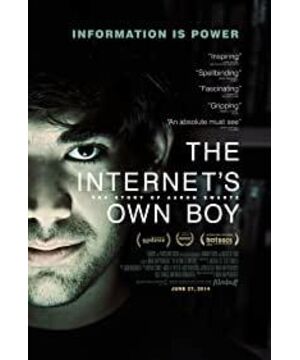Some people build the Internet and make a lot of money, and some build the Internet just to make the world a better place. The protagonist of our story, Aaron Swartz, positions himself as the latter. He has been curious about the world since he was a child, loves to learn, love to share, and after contact with computers, he quickly learned to program and integrates into the Hacker community. At the age of 14, he drafted the RSS 1.0 protocol, and later participated in the promotion of Creative Commons and created the Open Library. . org, during MIT, became the founder of the famous website Reddit. The protagonist at this stage is constantly exploring and practicing, and constantly creating to promote the progress of the world. However, his persistence in the spirit of the Internet and the openness of knowledge caused him to do something that alarmed the government. While at MIT, taking advantage of the free access to Jstor on campus, he used his personal computer to download academic papers on Jstor in batches. In fact, batch downloading of papers often happens, and our school library has issued a notice telling us not to do this. Because the data provider will detect such behavior, and then block the IP, which will severely block the IP segment of the entire school, causing others to be unable to download the paper. Our protagonist also encountered a similar situation, but he just changed an IP and continued to download. Why does he download documents in batches? It is said that he is trying to analyze from a large amount of literature whether government funding will lead to biases in scientific research conclusions. Jstor did not directly shut down MIT's paper database access for this reason. By locating the IP, they found the personal computer of the protagonist in the computer room, and placed a camera in the computer room to collect evidence so that they could accuse the "suspect". Then, our protagonist was caught. What is the matter of downloading documents in batches? Maybe it's not that friends in the scientific research circle don't know. Scientists sought funding to build laboratories, and brought a group of postdoctoral, doctoral, master and technicians to work hard to do experiments. In the end, the papers were published all the time, just for more people to see. These papers should be in the public domain, and anyone can read them freely. However, making public domain content public is a profitable business, and Pacer's example is used in the film to illustrate this problem. The US government's electronic files (Pacer) should be public, but they still charge ordinary people. Our protagonist and his friends wrote a program, downloaded a large amount of data from a public library where you can freely access Pacer, and uploaded it to a Pacer that does not charge ordinary people. The recycler's website. Similarly, scientific research papers should also be public domain content without copyright, and publishers still charge readers, and individual readers need about $30 per paper to purchase (think about the average scientist reading at least 1 paper per day. Amount...), and research institutions can purchase the thesis database annually, and have "unrestricted" access within a specified period of time. MIT, like most research institutions, purchased the database provided by Jstor. And our protagonist uses a computer to simulate a person to visit these papers in batches. Such behavior is called "theft" and "piracy". Soon, this case was watched by the government, the FBI came to find someone, and the government forced the protagonist to sign a confession. They clearly told the protagonist's father that they just wanted to make this case a model, to kill the chickens and the monkeys, so that the restless Hackers don't "make trouble". MIT, which has always encouraged innovation, has also slapped its head on this issue, declaring "neutrality." However, after the verdict was pronounced, Jstor quickly posted a statement on his website stating that it was not their intention to sue Aaron. Richard Matthew Stallman, who also struggled for freedom, traveled around the world to speak to people about free software and his GNU Public License (GPL), choosing a smarter method. The Free Software Foundation he established, as the legal person of the GPL, can adapt to the copyright (copyright) law of the United States; and the GPL itself does encourage shared anti-copyright licenses (copyleft). Therefore, the software released under the GPL agreement, their copyright protection legal person is the Free Software Foundation, GPL not only guarantees that the information sharing between authors can not be restricted by copyright, but also ensures that the misappropriation of GPL-protected information can still be used. Litigation in accordance with the copyright laws of the United States. And our protagonist is not so "smart", he doesn't understand the vastness of American law. According to the agreement between MIT and Jstor, the protagonist’s behavior is legally embezzling Jstor’s services. Even if the paper itself is not copyrighted, the document database compiled from the paper can be copyrighted. . The key question remains: How can the content of the public domain be made public? What’s interesting is that in recent years, Open Access journals have suddenly sprung up like bamboo shoots after a rain. For me, I found interesting papers Open The proportion of Access has exceeded 50%. It cannot be denied that this is very likely to be related to our protagonist. Just like the protagonist said (to the effect): The Internet is the best place and the worst place. On the one hand, it is the openness of information that everyone can publish, and on the other hand, it is the censorship of information, and everyone is monitored (in China). , The Internet is still blocked), they will always exist. And what the Internet is like, we need each of us to participate in it. The demandprogess led by the protagonist finally led the public to change the outcome of SOAP. This is a big victory for the public in the seemingly democratic United States (PS, I have received anti-SOAP emails). What about in China? The similar case of Chen Shoufu did not attract enough attention, and there was no loud voice even in the programmer community. Not to mention the YOU KNOW WHAT, which goes against the historical trend, has not legislated, has caused the country and the people, and has been hiding in the dark but pervasive. Whoever controls the Internet controls the future-but the Internet has always belonged to each of us. Although some people have always wanted to take away the right to freely obtain information from us, they have not succeeded yet. To defend our Internet, more netizens need to be awakened. Aaron Sawartz is a famous one, the one who died young, but it won't be the last. I have received anti-SOAP mail). What about in China? The similar case of Chen Shoufu did not attract enough attention, and there was no loud voice even in the programmer community. Not to mention the YOU KNOW WHAT, which goes against the historical trend, has not legislated, has caused the country and the people, and has been hiding in the dark but pervasive. Whoever controls the Internet controls the future-but the Internet has always belonged to each of us. Although some people have always wanted to take away the right to freely obtain information from us, they have not succeeded yet. To defend our Internet, more netizens need to be awakened. Aaron Sawartz is a famous one, the one who died young, but it won't be the last. I have received anti-SOAP mail). What about in China? The similar case of Chen Shoufu did not attract enough attention, and there was no loud voice even in the programmer community. Not to mention the YOU KNOW WHAT, which goes against the historical trend, has not legislated, has caused the country and the people, and has been hiding in the dark but pervasive. Whoever controls the Internet controls the future-but the Internet has always belonged to each of us. Although some people have always wanted to take away the right to freely obtain information from us, they have not succeeded yet. To defend our Internet, more netizens need to be awakened. Aaron Sawartz is a famous one, the one who died young, but it won't be the last.
View more about The Internet's Own Boy: The Story of Aaron Swartz reviews









